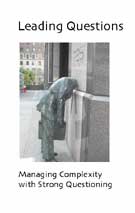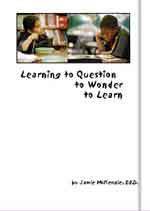
fno.org
|
|
| Vol 16|No 3|February|2007 | |
| Please feel free to e-mail this article to a friend, a principal, a parent, a colleague, a teacher librarian, a college professor, a poet, a magician, a vendor, an artist, a juggler, a student, a news reporter or to anyone else you think might enjoy it. | |
|
|
Go find out about China!
|
When students conduct topical research, they do little more than scoop up information. Topical research requires little thinking and little imagination. It pays few dividends. It does almost nothing to prepare students for the kinds of thinking skills listed in state and provincial curriculum standards.
These assignments stress collecting rather than interpreting and analyzing. Some schools have invested millions in fancy equipment so that students can do old-fashioned research with modern tools. What a huge waste of money. We must put an end to topical research! First students scoop. Then they smush. It is a school ritual that serves students poorly and accomplishes little of worth. Note the article "Smushing is Simply Low Grade Synthesis" at http://fno.org/apr05/smushing.html. If we keep assigning topics, students will drive their earth moving equipment through the Conduct a Google search for each of the topics above and the number of Web pages for each is impressive. In no time at all a student can scoop up millions of pages. Reading? That is quite another matter.
Quality? Wikipedia, the free encyclopedia, dominates all of these searches, appearing in the top ten every time.
|
|
| Investing in Effective Teaching instead of Machines
For two decades now schools have been seduced into buying lots of equipment so that students can become smarter. Sadly, we have no convincing evidence that the investments have paid off. Students become smarter when teachers show them how to use their minds to wrestle with challenging questions, but scooping and smushing does little to advance their skill. We would have done better investing in professional development and program development - changing the types of assignments so that students would be required to make answers instead of finding answers. Fewer computers. More effective teaching. That's what we need. Most teachers learned about research by going through school and completing topical research assignments. They then become teachers and carry the tradition onward. |
|
| Converting Topical Research into Something More Powerful
For more than a decade this publication has been suggesting ways to transform school research so that students must think for themselves and make up their own minds. Here are two articles designed to support teachers in this effort: 1. The Great Question Press No more trivial pursuit. No more topical research. No more hunts for simple facts - deadly, tiresome and lacking in value, mind-numbing activities without ... 2. From Trivial Pursuit to Essential Questions When we limit students to trivial pursuit, we make a mockery of authentic research and deprive them of a chance to explore the tough issues, choices, ... |
|
|
Credits: The photographs were shot by Jamie McKenzie. |
|


 information landfill, pleased by the height and depth of the piles.
information landfill, pleased by the height and depth of the piles.